 François Koepp, CEO & Secretary General of HORESCA asbl;
Credit: François Koepp
François Koepp, CEO & Secretary General of HORESCA asbl;
Credit: François Koepp
In a telephone interview with Chronicle.lu, François Koepp, CEO and Secretary General of HORESCA asbl, explained how the federation has been working closely with the Luxembourg government to secure sufficient financial aid for businesses in the hospitality sector amid the COVID-19 crisis.
It is no secret that the hotel, restaurant and café (HoReCa) sector has been hit hard by the pandemic. Following the first temporary closure of bars and restaurants in spring 2020, the sector was permitted to reopen (under certain restrictions) at the end of May before being forced to close again in November 2020. Whilst shops, schools and cinemas could reopen in January 2021, the temporary closure of restaurants and bars was extended first from 15 to 31 January, then to 21 February and now again to 14 March 2021.
Discussing the potential timeline for the sector's reopening, HORESCA's François Koepp expressed doubt that restaurants and bars really would reopen on 14 March. The widespread feeling in the sector is that this date will be pushed back further to 1 April 2021 at the earliest. Whilst some of the federation's members may not agree, Mr Koepp maintained that it was preferable to stay closed for a few more weeks if it meant safeguarding the overall economy and guaranteeing state aid.
On the subject of government financial aid, the HORESCA CEO and Secretary General explained that state aid (especially those introduced recently) had been sufficient for many businesses in the sector, albeit not for everyone. He stressed that the federation had been putting a lot of pressure on the Luxembourg government to introduce and strengthen financial assistance and that this had resulted in the introduction of partial unemployment for the sector towards the start of the pandemic and, more recently, the strengthening of stimulus aid and the aid scheme to support uncovered costs.
On Monday 15 February 2021, Luxembourg's General Directorate for Small and Medium-Sized Enterprises announced that the aid scheme to support uncovered costs will cover up to 25% of monthly turnover for the calculation of revenue for the period from February to June 2021 (provided that a legal closure is imposed). Through this measure, up to a quarter of business turnover will not be taken into account, which is expected to benefit cafetiers and restaurateurs who offer a take-away service or provide home delivery. In addition, all uncovered costs will be taken into account for the calculation of the aid for the period from February to June 2021 and for companies subject to a legal closure respectively those which have suffered a loss of turnover of at least 75% due to legal restrictions on gatherings. The aid scheme has been extended for three months, i.e. until June 2021 inclusive. Starting in February, the state will also cover up to 100% of uncovered costs for hotels, provided their turnover is 75% below that of 2019.
For HORESCA, these measures are a significant improvement from those offered at the beginning of the pandemic. The federation is also trying to negotiate a further extension of financial aid depending on how long the pandemic lasts and how quickly Luxembourg's vaccination roll-out progresses. François Koepp noted that some businessowners and employees in the sector had not yet fully understood which measures are in place and how to obtain the financial aid. For this, HORESCA teamed up with the Chamber of Commerce to provide twelve specialists who are available to help people fill out their requests for aid at the House of Entrepreneurship. Details of the various aid schemes on offer can also be found on the HORESCA website. In other cases, accounting issues have led to errors and companies receiving less aid than that to which they are entitled; such issues are up to individual companies to address with their accountants. Mr Koepp added that state aid is often granted and received quickly (within fourteen days) if the requests are complete and correct.
François Koepp also pointed out that the HORESCA federation had not been involved in last Thursday's protest (attended by hundreds of workers from the hospitality sector) in the capital. Instead of taking to the streets, the federation prefers to negotiate with the government ministers and obtain concrete results. Mr Koepp noted that the small HORESCA team had meetings with the relevant ministries at least once per week and was working around the clock to reach a compromise; in the first weeks of the pandemic, the federation received around 5,000 phonecalls.
Whilst the financial assistance may not be enough for everyone in the hospitality sector and no amount of aid will replace a well-runn business, HORESCA's CEO and Secretary General was confident that the results of negotiations with the government represented the best possible solution for at least 80% of the federation's members. He recalled that it was important to go into such meetings with realistic expectations, rather than "demanding the impossible", and noted that the existing financial aid in Luxembourg was already higher than in other countries.
François Koepp concluded that HORESCA had opted for an attitude of cooperation and solidarity, showing the government its willingness to accept the health decisions. He added that "the country must show solidarity in return", regarding future assistance.








